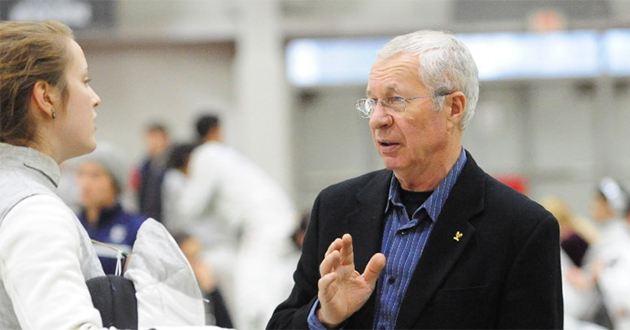
Vladimir Nazlymov is retiring from his position as Ohio State’s head fencing coach after 19 seasons. Credit: Courtesy of OSU
Vladimir Nazlymov didn’t create the Ohio State fencing program, but in his 19 seasons as its head coach, he built it into a national powerhouse.
Three national championships, nine individual NCAA titles and 11 Midwest Fencing Conference crowns later, Nazlymov announced last week he is retiring, marking an end to an illustrious career and leaving behind a lasting impact on those he coached.
“I can’t even imagine what my last year of eligibility to fence for Ohio State will be like because I can’t even imagine Ohio State fencing without Vladimir Nazlymov,” said Oliver Shindler, a junior on the team.
“He’s had such an amazing career, he deserves to retire and go be with his grandchildren and go be with his wife,” Shindler added. “I respect that a lot for him because I know how much he loves the sport, and how hard it is for him to walk away.”
Nazlymov, 72, walks away with a resume that teemed with success before he even arrived in Columbus. Born in Makhachkala, Daghestan, Nazlymov won six medals — including three gold — while representing the Soviet Union across four Olympics from 1968 to 1980. He also captured 10 world championships, and coached the Soviet Union to a silver medal in the 1988 Olympics.
After moving to the U.S., Nazlymov was the sabre coach for the national team from 1994 to 1999. He also captained it at the world championships from 1995 to 1997. The International Fencing Foundation twice named him the world’s best fencer, in 1975 and 1977, and elected him to its hall of fame for his coaching success.
That was all before he turned Ohio State’s program into a stepping stone for Olympic success, with 10 of his Ohio State athletes having gone on to compete in the Olympics.
“He’s really an important figure in fencing history,” said Isabel Alvarez, who fenced for Colombia from 2003 to 2007 and now owns Pro Fencing in Lewis Center. “He’s a legend.”
Both Shindler and Alvarez said part of Nazlymov’s success as a coach is due to his uncanny ability to motivate.
Alvarez experienced that when she trained under Nazlymov and later on whenever he would visit her training center.
“He gives you this feeling like, ‘Yeah, I can do this,’” said Alvarez, who called Nazlymov one of the best sabre coaches in the world.
Shindler witnessed it when he first met with Nazlymov in 2014 at a North American Cup event in Columbus. Entering his senior year of high school, Shindler was being recruited by other top programs like Duke, Notre Dame and Penn State, but Nazlymov stood out.
One of the first things Nazlymov told Shindler, who has Olympic aspirations, was, “If you want to be a champion, Ohio State is where you need to come.”
After an official visit, Shindler was sold.
“He sees the sport in a completely different way than anyone else sees it,” Shindler said. “It’s not just about the athletic part of fencing. It’s a math game.”
Before competitions, Shindler said Nazlymov provided the team with detailed information about how many points the team needed to win and what every person needed to do in individual bouts.
“Like what we can lose by, what we can win by — everything so we’re prepared,” Shindler said. “Obviously he doesn’t want to lose. He has never hated anything more than losing. He hates second place, he hates anything but first place, but he has a cushion for what we can do to do well.”
Perhaps above all, though, Shindler said the way in which Nazlymov cared about his athletes separated him from his peers.
When Shindler’s grandfather recently passed away, Nazlymov pulled Shindler into his office to comfort him and offer his support. Or when Shindler’s performance was dipping during a stretch of five straight competitions, including two at the international level, Nazlymov helped Shindler one-on-one, telling him to go to the sauna to relax and working with him on basic fundamentals.
Ultimately, those pieces of advice and hours of coaching helped Shindler return to the level of performance he knew he was capable of, and it’s why Nazlymov’s impact on fencing — not only at Ohio State, but across the sport generally — will continue to be felt.
“The way that he cares, to him this isn’t a sport, it’s his life,” Shindler said. “To him it wasn’t a team, it’s a family.”


